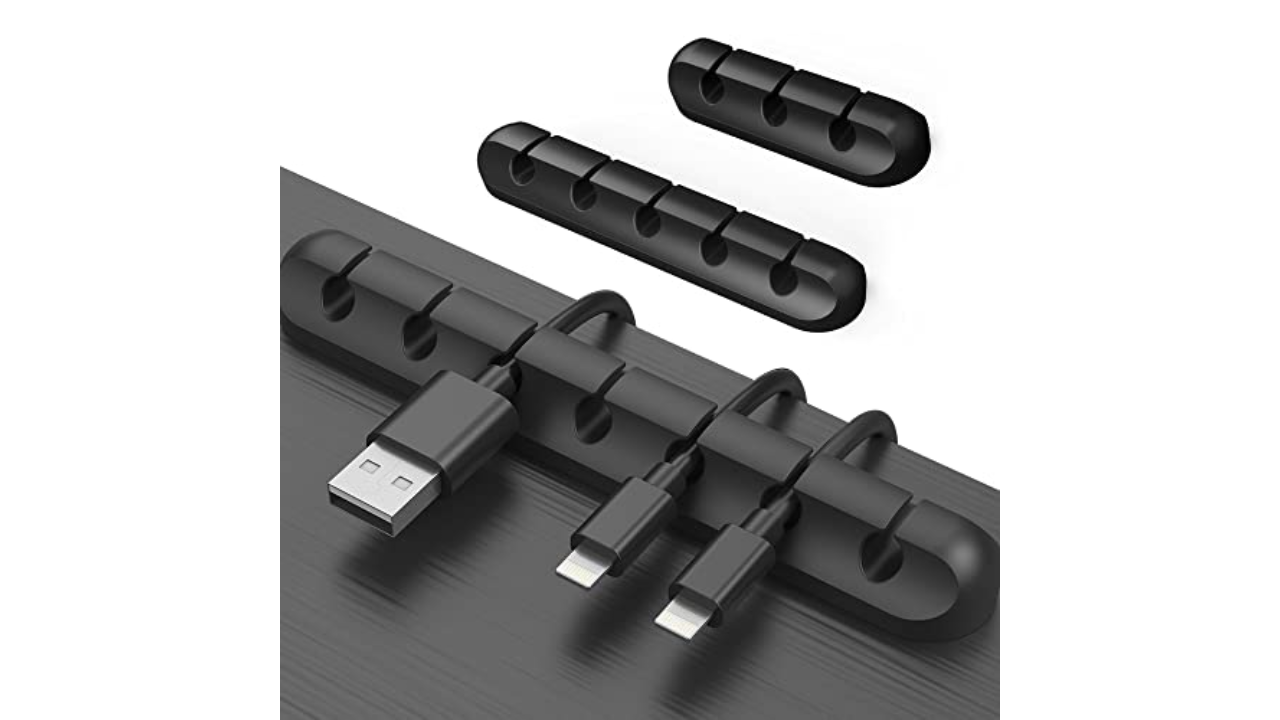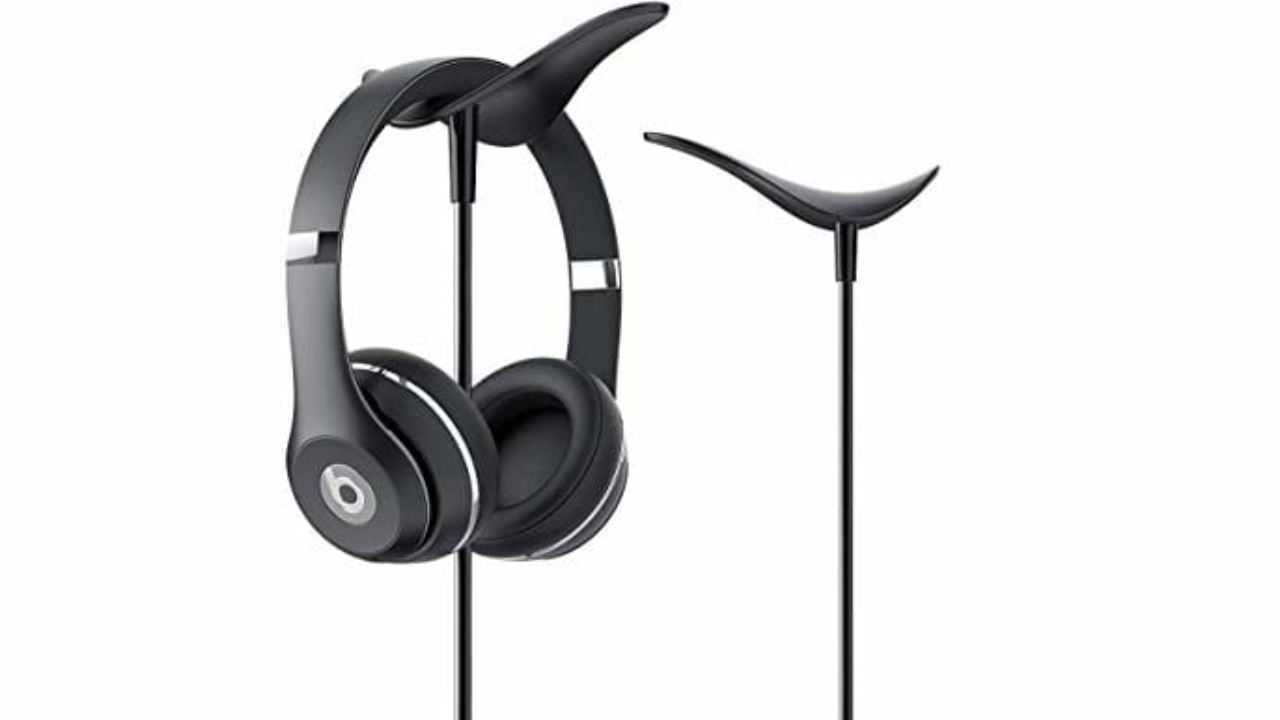How to organize your desk at home
It's time to clean up your work-from-home setup.
Some people are fine working amongst chaos, while others can’t type a word if a Post-It is out of place. Those of us who fall somewhere in between may have desks that go from meticulous to mayhem over the course of a week. If you’re looking for a way to keep things on the neater side of the spectrum, some of these gadgets may help. Here are our recommendations for a more organized work-from-home setup.
We suggested getting an external monitor in a previous WFH guide, too, and for good reason. It seriously increases your screen real estate and is oftentimes easier on the eyes. However, not all monitors are height adjustable and they do take up quite a bit of desk space. A monitor stand or riser is a way to resolve that. A simple yet effective one is the Amazon Basics model, which has stackable legs for your desired height (up to 4-⅞ inches) plus an 11-inch wide storage space underneath to store your laptop or other knick knacks.
If, on the other hand, you want something a little more stylish, this bamboo monitor stand from SONGMICS is a particularly attractive one. It comes with compartments designed to fit your phone, coffee mug, stationary, notepads and more. There are also well-placed cut-outs to help manage your cords and cables. We should note that the height isn’t adjustable, but in my experience its 3.35-inch range was enough to raise our monitor to eye level. This particular model also works well as a laptop stand thanks to three holes designed for optimal heat ventilation.
If you really don’t want a monitor on your desk at all, consider a monitor arm. This is an especially good choice if you’re restless and need to change your monitor position frequently. One of our favorites is the Jarvis monitor arm by Fully, which features a 360-degree swivel. It has a removable VESA plate and a clamp mount, plus the option of mounting the arm to grommet holes if your desk has them. It accommodates 13- to 32-inch monitors and can support a max weight of 19.8 pounds. — Nicole Lee, Commerce Writer
Hunching your shoulders to look at your screen is harmful for your posture, which can lead to back, neck and arm pain if you’re not careful. Instead, you’ll want your screen to be at eye level, and if you don’t have an external monitor, that means elevating your laptop with a stand. This has the added benefit of giving you more desk space as well.
We particularly recommend the Rain Design iLevel2. The height is easily adjustable thanks to a front slider, and its tilted design is also great for keeping your laptop cool. Alternatively, a slightly more affordable option is Rain Design’s own mStand, which has a fixed height and a cable organizer in the back that helps keep wires tucked away. Plus, it’s available in four different colors: black, gold, silver and space gray.
If you’re tight on cash, the Nulaxy Laptop Stand is a more affordable option. Though it does have a fixed height, its open design allows for heat dissipation and airflow. It’s also large enough to accommodate laptops up to 16-inches wide.
If you do own an external monitor but don’t have a lot of extra space, we recommend a vertical stand. This one from Omoton can hold your closed laptop upright, which goes a long way in keeping your desk organized. It has an adjustable width varying from 0.55 to 2.71 inches, which should fit most laptops. The stand itself is made from scratch-resistant anodized aluminum alloy and has a wide, heavy base that will prevent your laptop from tipping over. — N.L.
If a laptop is your preferred (or required) daily computer, you may find yourself wishing for more ports. A docking station will let you connect to a monitor or two, a webcam, mic, wired keyboard or just about any other accessory you need to take care of business. Plus you can take advantage of far faster connection speeds with a dock’s Ethernet port. We tested quite a few options and think MacBook users should go for Satechi’s Dual Dock Stand. It neatly tucks beneath your laptop and gives you Ethernet and monitor ports (both HDMI and DisplayPort) plus two USB-A and USB-C connections each. It plugs into the two USB-C slots at the side of MacBook Pros and newer Air models, and doesn’t require external power like most docking stations. Unfortunately, it doesn’t have Thunderbolt ports.
For Chromebooks, we liked the Kensington SD4780P docking station because it has plenty of USB-A ports (though just one downstream USB-C) and puts the host connection at the back, which will help keep your desk neater. And for Windows laptops, we suggest Kensington’s AD2010T4 Thunderbolt docking station because it’s competitively priced and offers a good number of connections. — Amy Skorheim, Commerce Writer
A dedicated phone stand is a great way to keep your desk clutter-free while charging your handset at the same time. If you have a phone with wireless charging, we strongly recommend using a wireless charger so you don’t have to mess around with pesky cords. The Anker 313 Stand is a good option as it supports 10W high-speed charging with the latest Samsung Galaxy handsets and 5W charging with recent iPhones like the iPhone 15. We especially like how affordable it is ($20 as of this writing), though keep in mind that you need to supply your own power brick.
If you have a phone without wireless charging, we recommend the Lamicall stand, as it has a feeder hole for the charger cord on the back. The stand is made from a high-quality aluminum alloy and the cradle can be tilted back and forth for different viewing angles. If you like, you can position your phone horizontally to watch videos.
If you want to charge several Apple devices all at once, consider a multi-device charger. Our favorite is the Belkin BoostCharge Pro 3-in-1 pad as it features 15W MagSafe charging for the iPhone, fast charging for Apple Watches plus a spot for AirPods or any other Qi-compatible earbud case. The Apple Watch charger is especially notable as it works not just horizontally and vertically, but there’s also a knob that lets you accommodate different sizes plus third-party cases. On top of that, the horizontal layout lets you charge any wireless phone at reduced speeds.
Alternatively, if you want a version with a smaller footprint, the BoostCharge Pro 3-in-1 wireless charger is a fantastic option. It also has MagSafe 15W charging and it’ll charge the Apple Watch and AirPods as well. However, the indented earbud pad means you can’t charge a second phone on it.
If you want something more affordable, this Anker MagGo charging station is a solid option as well. It only has a single magnetic charging pad on the front for your phone, but it does have a bunch of ports – three AC outlets, two USB-C ports and two USB-A ports – for charging other devices.
One way to really save some space is to get a lamp with a wireless charger built into the base. The IKEA Hektar has a classic look with a 5W induction charger, plus an extra USB port so you can charge two devices at once. Alternatively, this LED desk lamp by AFROG packs in a lot of features in a relatively small footprint. It has a wireless charger, a USB charging port, five lighting modes with seven levels of brightness plus a 30 or 60 minute shutoff timer.
For a more futuristic design, the Taotronics LED desk lamp’s slim style might be more your speed. It supports fast charging up to 7.5 watts (for iPhones) or 10 watts (for Samsung Galaxy phones) , an extra USB port on the side; five different color temperatures; and an option for a one-hour dimmable desk lamp timer that’ll turn off when you go to bed. — N.L.
Like most people, you probably have a mess of cords dangling behind your desk. A simple way to overcome that is with a few simple cable management tools. The easiest would be to use either twist ties or Velcro wrap ties like these, which are strong, reusable and affordable.
Another option is to use a cord management organizer like these cable clips. They let you organize seven cables with a single clip, which you can then attach to your desk or wall with a self-adhesive backing. You’ll never have to worry about the cord falling behind the desk.
One common eyesore in most homes are those overflowing power strips with cables strewn all over the place. A cable management box like this one from D-Line can help keep all of it contained in one attractive unit and make areas under your desk easier to clean. The box comes in white or black, has three cord entry and exit points and is large enough to fit most power strips. — N.L.
Over-the-ear headphones provide superior sound, but can take up a good deal of space on your desk when not in use. Instead, try hanging them on a headphone stand which, aside from keeping your space tidy, can also protect your headphones from getting scratched. This affordable one from Lamicall is made out of aluminum and ABS plastic and has a low center of gravity, which makes for a more stable base. It also has a simple and stylish “bird-shaped” look that will add a nice touch of flair to your desk space.
Alternatively, you can also choose to keep your headphones out of sight entirely with an under-desk hook like the Anchor, which has space for two sets of headphones. It’s made out of premium silicone and secures safely to your desk with 3M adhesive strips. There are optional screw mounts if you want to make the placement a little more permanent. — N.L.


